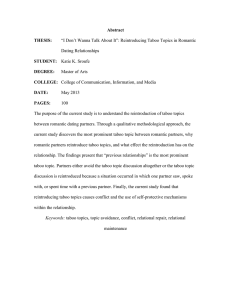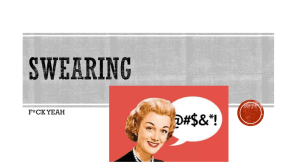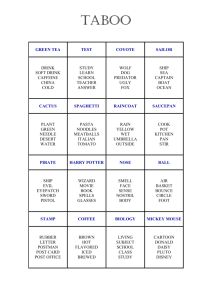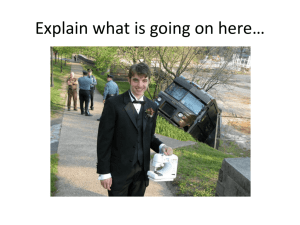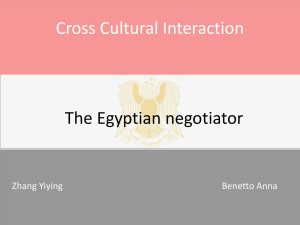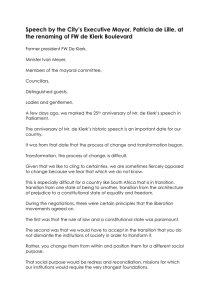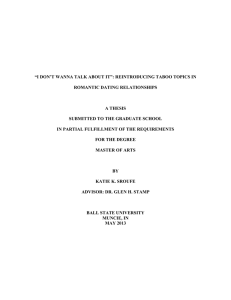Pejorative-terms-and-representations
advertisement
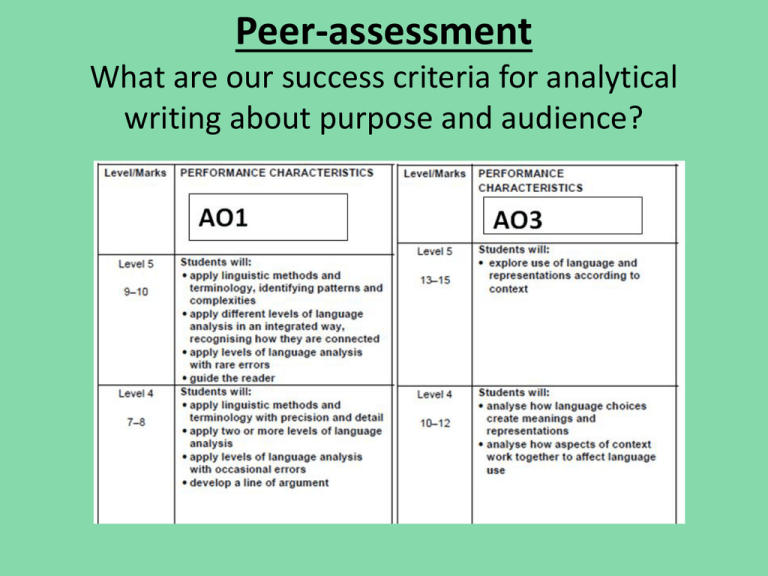
Peer-assessment What are our success criteria for analytical writing about purpose and audience? Understanding representation: social groups Representation: the portrayal of events, people and circumstances through language and other meaning-making resources to create a way of seeing the world Starter: how do the following terms represent the social groups to which they refer? pikey hobo queer chav coloured boy sissy biddy oap God botherer frog black immigrant non-white fairy homo wimp hoodie maverick tranny yuppie Bible basher oriental boche cis-gender Look up any terms if you’re not sure. Are they pejorative or neutral? How many stigmatise the group to which they refer? Pejorative terms a word expressing contempt or disapproval • Often, the choice of words used to describe a group of people can indicate a stereotype or particular attitude towards the group. • While some terms stigmatise these groups, other terms have been reappropriated by the groups, or reclaimed so that the word seems normal or even complimentary. • Can you think of any terms which have been reappropriated by the group to which they refer? The Power of Language • Don Kulick of Stockholm University, writing with reference to terms for gay and lesbian people, notes that ‘naming confers existence’ (2000). • This suggests that naming is a significant act: if you give something a name, you say that it exists, while simultaneously defining it. If there is not a name for it, it does not exist. If the name is pejorative, it is automatically stigmatised. The Power of Language • In 2000, for instance, Greater Manchester Police were issued with a document called ‘The Power of Language’, detailing terms considered inappropriate for police officers to use. • http://www.telegraph.co.uk/news/uknews/13 56233/Police-officers-told-to-mind-theirlanguage.html The Power of Language • John Harris, writing in The Guardian in 2006, suggested that using the term chav is a matter of ideology and a form of snobbery: – “The chav phenomenon – the mass mockery of a certain kind of young, Burberry-check wearing, borderline criminal, proletarian youth...actually denotes the mind-boggling revival of privileged people revelling in looking down their noses at the white working class.” The Power of Language • Conversely, reappropriation arguably turns the power of language to define and stigmatise on its head: – ‘The emergence in the 1990s of ‘queer’ as a self-label for proud gay men and lesbians [was] a label that previously had been a deliberate and resented epithet. Similarly, many gay rights organisations use the symbol of the pink triangle, a symbol used in Nazi Germany to identify gays, to promote awareness of discrimination against gays. A marking mechanism that had been used as a device of discrimination was transformed into a tool of tolerance, a symbol of pride and self-acceptance.’ – Galinsky, A. D., Hugenberg, K., Groom, C. and Bodenhausen, G. (2003) ‘The Reappropriation of Stigmatizing Labels’, in J. Polzer (ed.) Research on Managing Groups and Teams, vol. 5, Elsevier Science, p. 231 A real-life example In the light of the recent immigration crisis in Europe, renewed focus on choice of words such as immigrant, migrant and refugee is evident: Migrant Denotation Connotation What might this tell us about the people using the word? Refugee How does this article extend your understanding of this topic? Homework • TWO things to read and be ready to comment on next lesson: – An important article by Vivian de Klerk about taboo language and gender. If the link doesn’t open, copy and paste the URL into your browser, or search the title in Google Scholar. Free PDFs should be available, or you will be able to find it on JSTOR while in school. Bibliographical information on the next slide to help you search for it. http://www.researchgate.net/profile/Vivian_Klerk/publication/29807 278_How_taboo_are_taboo_words_for_girls/links/004635396ffcc8c9 6f000000.pdf – ANY post from Deborah Cameron’s blog. Please don’t all just read the first article. • To help you, please write a list of bullet points of key ideas which you learnt/found interesting in these articles. • De Klerk, V. (1992) How taboo are taboo words for girls. Language in Society. 21. 277289.
